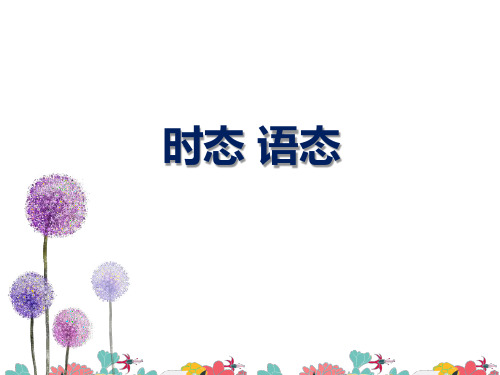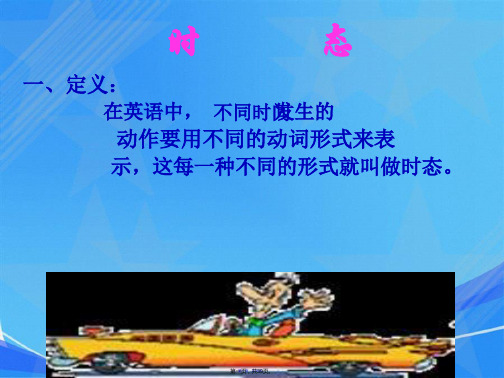初三英语时态复习公开课正式
合集下载
九年级英语新目标时态复习公开课课件

They will have a sports meeting next
Tuesday. 他们下周二将举行运动会。 2.也可以用“be going to+动词原形〞这个
结构来表示根据目前迹象很有可能发生的 某件事情,或是打算、方案、以及决定要 做某件事情等。
• They _w_o__n_’t_c_a_l_l _ (not call) you the day after tomorrow.
• 12. __D_o________ Kate's sisters __p_la_y___(play)
cry stop
plan
wanted answered moved died carried cried stopped planned
get got take took go went swim swam eat ate drink drank are were have had do did come came cut cut put put say said see saw
(get) up at 6:30.
2. Listen! Someone __is__k_n_o__c_k_in__g_ (knock) at
the door.
3. I __w__a_s______〔be〕in Beijing two years ago. 4. How often _d_o_e__s_ Andy __s_u_r_f__ (surf) the
• Look! He _i_s_p_la_y_i_n_g (play) basketball over there.
• Listen! __I_s___ Sally _s_in__g_in__g(sing)?
Tuesday. 他们下周二将举行运动会。 2.也可以用“be going to+动词原形〞这个
结构来表示根据目前迹象很有可能发生的 某件事情,或是打算、方案、以及决定要 做某件事情等。
• They _w_o__n_’t_c_a_l_l _ (not call) you the day after tomorrow.
• 12. __D_o________ Kate's sisters __p_la_y___(play)
cry stop
plan
wanted answered moved died carried cried stopped planned
get got take took go went swim swam eat ate drink drank are were have had do did come came cut cut put put say said see saw
(get) up at 6:30.
2. Listen! Someone __is__k_n_o__c_k_in__g_ (knock) at
the door.
3. I __w__a_s______〔be〕in Beijing two years ago. 4. How often _d_o_e__s_ Andy __s_u_r_f__ (surf) the
• Look! He _i_s_p_la_y_i_n_g (play) basketball over there.
• Listen! __I_s___ Sally _s_in__g_in__g(sing)?
《时态复习公开课初中英语中考时态复习绝对》PPT课件讲义

重读闭音节以一个 辅音字母结尾的, 双写这一字母+ing
get run swim
going asking writing taking getting running swimming
1.The twins a_r_e__w_a_s_h_i_n_g_(wash) the
clothes now.
2.Look! Hei_s_p_l_a_y_i_n_g(play) basketball
is comes is drawing moved didn’t have
used has studies will visit
Composition: I
Write an article about yourself, tell us your past、your present and your future.(你的过去、现在和将来)
1.The twins ___w_a__sh__e_d__(wash) the
clothes yesterday.
2.The day before yesterday he
_p_l_a_y_e__d_ (play) basketball over there. 3._D_i_d__ Sally _s_i_n_g__(sing) two hours
over there.
3.Listen! __I_s___ Sally _s_in_g_i_n_g_(sing)?
过去进行时: Past Progressive 概念: 表示过去正在发生的动作 结构: be (was,were) + doing 标志语:at 8:00 yesterday 、
when、 while、…
重读闭音节以一个 辅音字母结尾的, 双写+ed
时态复习公开课课件_初中英语中考时态复习课件(绝对精品).ppt

is comes is drawing moved didn’t have
used has studies will visit
Composition: I
Write an article about yourself, tell us your past、your present and your future.(你的过去、现在和将来)
clothes every day.
2.Sometimes he __p_l_a_y__s_ (play)
basketball over there.
3.How often d_o__e_s Sally _s_i_n_g__(sing)?
专项练习
• 1 I can take Li Ming there when he _____ ( come) to visit.
• 其时间状语为often(经常)、 usually(通常)、
always(总是)、 sometimes(有时)等频率副词, on Saturdays(在星期六)、 in the morning(afternoon evening)(在早上(下午 晚 上)) 、every day(每天) 等。
1.The twins ___w__a_s_h____(wash) the
1.The twins ___w_a__sh__e_d__(wash) the
clothes yesterday.
2.The day before yesterday he
_p_l_a_y_e__d_ (play) basketball over there. 3._D_i_d__ Sally _s_i_n_g__(sing) two hours
重读闭音节以一个 辅音字母结尾的, 双写这一字母+ing
中考英语时态复习公开课课件ppt

表示已经发生的动作对现 在造成的结果和影响
has done、 have done
already、 yet、ever、 标志语:
never、since…、for…、
get go eat are do cut say
got
gotten
went ate were did cut said
gone eaten been done cut said
1.istry teacher in a works school. 2. He ____________ there since Tom was born. has worked _____________________
worked 3. He ________ there more than thirty years ago. ____________________________
when、 while、…
一般将来时: Future Simple
概念: 表示将要发生的动作
结构: will do、 shall do、
be (is、am、are) going to do
标志语:tomorrow、in..、next…
过去将来时: Past Future Simple
概念: 表示过去将要发生的动作
take swim drink have come put see
took swam drank had came put saw
taken swum drunk had come put seen
have washed 1.The twins ___________(wash) the
clothes for an hour. has played 2.He ________ (play) basketball since three years ago. sung has 3.How long _____ Sally ______(sing) yet?
has done、 have done
already、 yet、ever、 标志语:
never、since…、for…、
get go eat are do cut say
got
gotten
went ate were did cut said
gone eaten been done cut said
1.istry teacher in a works school. 2. He ____________ there since Tom was born. has worked _____________________
worked 3. He ________ there more than thirty years ago. ____________________________
when、 while、…
一般将来时: Future Simple
概念: 表示将要发生的动作
结构: will do、 shall do、
be (is、am、are) going to do
标志语:tomorrow、in..、next…
过去将来时: Past Future Simple
概念: 表示过去将要发生的动作
take swim drink have come put see
took swam drank had came put saw
taken swum drunk had come put seen
have washed 1.The twins ___________(wash) the
clothes for an hour. has played 2.He ________ (play) basketball since three years ago. sung has 3.How long _____ Sally ______(sing) yet?
新人教版九年级英语《时态 语态》复习公开课课件

had + 过去分词 • 助动词:have及其变形
• 时态的判定通常根据时间状语; • now; every day; usually; often; always; • Just now; ago; last …; yesterday; • By far; so far; recently; already; since; for;
• 难点是一般过去时和现在完成时的区别。
点动词 Vs 延续性动词
• 英文中有些动词只能表示瞬间发生的动作(buy, borrow, happen, etc)另外一些则可以表示动作 延续一段时间(have, keep, live, etc) I bought this new bike last month. So I have had it for a month.
•
C. for two weeks
D. before two weeks
• 17. My brother _____ the Youth League since 1990.
•
A. joined
B. has been in
•
C. has joined
D. had joined
• 18. —Where is Peter?
2. He borrowed the book from me. He has kept it since last year.
• 4. I _____ as soon as you come back.
• A. went
B. have gone
• C. am going
D. shall go
• 5. The scientist _____ Canada and he will give us a talk when he _____ back.
• 时态的判定通常根据时间状语; • now; every day; usually; often; always; • Just now; ago; last …; yesterday; • By far; so far; recently; already; since; for;
• 难点是一般过去时和现在完成时的区别。
点动词 Vs 延续性动词
• 英文中有些动词只能表示瞬间发生的动作(buy, borrow, happen, etc)另外一些则可以表示动作 延续一段时间(have, keep, live, etc) I bought this new bike last month. So I have had it for a month.
•
C. for two weeks
D. before two weeks
• 17. My brother _____ the Youth League since 1990.
•
A. joined
B. has been in
•
C. has joined
D. had joined
• 18. —Where is Peter?
2. He borrowed the book from me. He has kept it since last year.
• 4. I _____ as soon as you come back.
• A. went
B. have gone
• C. am going
D. shall go
• 5. The scientist _____ Canada and he will give us a talk when he _____ back.
中考时态复习公开课课件

第二第十二十一一页页,,共共393+been to(曾经到过某地,人已回来)
I have been to Hangzhou many times.
2. Has/have+ gone to(去了某地,人在路上或在目的地)
…Where is Mr.Green?
第六第页六页,,共共393页9。页。
2. 一般过去时态(The Simple Past Tense)
概念: 表示过去某个时间发生的动 作或存在的状态
构成形式 : V+ed
常用时间状语 :
yesterday, just now, last …,
this morning, …ago, etc
第七页,共39页。
B. C. will wash D. has been washed
第十三页,共39页。
5. 现在进行时态( The Present Continuous Tense )
概念:表示现在或现阶段正在发生的动作
构成形式 : am/is/are+doing 常用时间状语 :
now,listen,look, right now, these days, at this moment,etc
since 1992
since I graduated from the university. He has been away from his home for 40 years.
3. 动词必须为可延续性动词
leave=be away from begin=be on arrive=be in borrow=keep buy=have …
常用时间状语 : already, just, before, yet, never, ever,etc.
I have been to Hangzhou many times.
2. Has/have+ gone to(去了某地,人在路上或在目的地)
…Where is Mr.Green?
第六第页六页,,共共393页9。页。
2. 一般过去时态(The Simple Past Tense)
概念: 表示过去某个时间发生的动 作或存在的状态
构成形式 : V+ed
常用时间状语 :
yesterday, just now, last …,
this morning, …ago, etc
第七页,共39页。
B. C. will wash D. has been washed
第十三页,共39页。
5. 现在进行时态( The Present Continuous Tense )
概念:表示现在或现阶段正在发生的动作
构成形式 : am/is/are+doing 常用时间状语 :
now,listen,look, right now, these days, at this moment,etc
since 1992
since I graduated from the university. He has been away from his home for 40 years.
3. 动词必须为可延续性动词
leave=be away from begin=be on arrive=be in borrow=keep buy=have …
常用时间状语 : already, just, before, yet, never, ever,etc.
中考时态复习公开课课件

第六页,共40页。
Exercise
1.I __f_o_u_n_d_____(find) my ruler in my
desk five minutes ago .
2.We looked upand ______s_a_w__(see) lots of
birds _____f_ly__in_g__(fly) over the trees.
第三页,共40页。
Exercise
1. Who ___d__a_n_c_e_s__(dance) best in your class? 2. 2. Students usually __h_av_e______(have) ten
minutes’ rest between two classes.
第四页,共40页。
1.一般如今时态( The Simple Present Tense)
概念:表示经常发生的或习惯性的动作或状
态。
构成形式 : do / does(三单)
常用时间状语 :
every day, always, usually, often, sometimes, on Sundays, three times a day , etc
b. When引导的时间状语从句 c. I was reading a book when Jim called. d. c. While 引导的时间状语从句 e. The UFO took off while the man was taking photos.
第十八页,共40页。
过去进展时的注意点:
第五页,共40页。
一般如今时的注意点:
1 、表客观事实或普遍真理
The earth __g_o_e_s(go) round the sun . 2 、 在when ,as soon as, until, after, before等到引导的时间状语从句和if 引导的 条件状语从句中, 用一般如今时表示将来.
Exercise
1.I __f_o_u_n_d_____(find) my ruler in my
desk five minutes ago .
2.We looked upand ______s_a_w__(see) lots of
birds _____f_ly__in_g__(fly) over the trees.
第三页,共40页。
Exercise
1. Who ___d__a_n_c_e_s__(dance) best in your class? 2. 2. Students usually __h_av_e______(have) ten
minutes’ rest between two classes.
第四页,共40页。
1.一般如今时态( The Simple Present Tense)
概念:表示经常发生的或习惯性的动作或状
态。
构成形式 : do / does(三单)
常用时间状语 :
every day, always, usually, often, sometimes, on Sundays, three times a day , etc
b. When引导的时间状语从句 c. I was reading a book when Jim called. d. c. While 引导的时间状语从句 e. The UFO took off while the man was taking photos.
第十八页,共40页。
过去进展时的注意点:
第五页,共40页。
一般如今时的注意点:
1 、表客观事实或普遍真理
The earth __g_o_e_s(go) round the sun . 2 、 在when ,as soon as, until, after, before等到引导的时间状语从句和if 引导的 条件状语从句中, 用一般如今时表示将来.
- 1、下载文档前请自行甄别文档内容的完整性,平台不提供额外的编辑、内容补充、找答案等附加服务。
- 2、"仅部分预览"的文档,不可在线预览部分如存在完整性等问题,可反馈申请退款(可完整预览的文档不适用该条件!)。
- 3、如文档侵犯您的权益,请联系客服反馈,我们会尽快为您处理(人工客服工作时间:9:00-18:30)。
2. He __p_la_y_ed basketball yesterday. He di_d_n_’t_p_laybasketball yesterday. D_i_d_ he _p_la_y_ basketball yesterday?
变为否定句:动词前加didn’t , 动词用原形 变为疑问句: 句前加did , 动词用原形
(1) I play basketball everyday. (2) The moon moves around the sun.
Light travels faster than the sound. 结构:主语+动词原形/单三形式
一般现在时常用的标志词:
1.every day / week / month / year ually Often sometimes never 3.Once a week twice a month
变为否定句: 加don’t 或 doesn’t 变为疑问句: 加do 或 does
一般过去时
一般过去时的意义: 表示过去某个时间发生的动作或存
在的状态。 (1) I went to the zoo yesterday. (2) I was in Shanghai last year.
结构:主语+动词过去式
一般过去时常用的标志词有: 1.yesterday ,the day before yesterday, st week / month / year 3.just now 4.two days ago
记一记吧!
Time to eat and play
1. I __a_te__ an apple yesterday. I d_id_n_’t_e_at an apple yesterday. D__id_ you _e_a_t an apple yesterday?
现在进行时常用的标志词有: now look listen
记一记吧!
Time to eat and play
1. I am__e_a_t_ing an apple now. I am__n_o_t_eating an apple now. A__re_ you e_a_t_ing an apple now?
1. I w_i_ll_e_a_t an apple tomorrow. I w_o_n_’t_e_at an apple tomorrow. W__il_l you _e_a_t an apple tomorrow?
2. He is__g_o_in_g tobapslakyetball tomorrow. isn’t going to play
现在进行时
现在进行时的意义: 表示现在正在进行或发生的动作
(1) I’m doing my homework. (2) Listen,she is playing the piano. (3) look,he is playing ping-pong. 结构:am/is/are +现在分词(v-ing)
记一记吧!
Time to eat and play
1. I __e_a_t_ an apple every day. (陈述) I d_o_n_’t_e_at an apple every day. (否定) D__o_ you _e_a_t an apple every day?(疑问)
2. He __p_la_y_s basketball every day. Hedo_e_s_n_’t_plabyasketball every day. D_o_e_she __p_la_y basketball every day?
2. He is__p_la_y_ing basketball now. Heisn_’_t _p_la_ying basketball now. _Is__ hepl_a_y_in_g basketball now?
变为否定句: am is are 后加 not 变为疑问句: am is are 提到句首
He _____ basketball tomorrow. I_s__ he g_o_in_g_ tobasketbng to 结构
变为否定句:will/shall 后加not am/is/are后加not
变为疑问句:will/shall提句首 am/is/are提前
人教版新目标九年级英语
Review of Tenses
初中英语常见八种时态
一般过去时 一般现在时 一般将来时 现在进行时 过去进行时 现在完成时 过去完成时 过去将来时
一般时态 进行时态 完成时态
一般现在时
一般现在时的意义:
1.表示经常性或习惯性的动作或存在的 状态。
2.表示客观事实或真理。
一般将来时
一般将来时的用法: 1.表示将要发生的的动作或存在的状态。 2.表示计划或者打算要做的事。 be going to + 动词原形 (1) I am going to be a basketball player. will / shall + 动词原形 (2) I will study hard in future.
过去进行时
过去进行时的用法:
表示过去某个时间正在发生的动作 或存在的状态。
1.I was doing my homewrok at this time yesterday. 2. She was sleeping at 9 o’clock yesterday.
结构: was /were+ 现在分词(v-ing)
一般将来时常用的标志词有:
1.tomorrow, the day after tomorrow 2.next week / month / year 3.in短语: in three minutes 4.soon, right away, at once
记一记吧!
Time to eat and play
过去进行时常用的标志词 1.at this time yesterday at that time 2. at 9 o’clock last night
变为否定句:动词前加didn’t , 动词用原形 变为疑问句: 句前加did , 动词用原形
(1) I play basketball everyday. (2) The moon moves around the sun.
Light travels faster than the sound. 结构:主语+动词原形/单三形式
一般现在时常用的标志词:
1.every day / week / month / year ually Often sometimes never 3.Once a week twice a month
变为否定句: 加don’t 或 doesn’t 变为疑问句: 加do 或 does
一般过去时
一般过去时的意义: 表示过去某个时间发生的动作或存
在的状态。 (1) I went to the zoo yesterday. (2) I was in Shanghai last year.
结构:主语+动词过去式
一般过去时常用的标志词有: 1.yesterday ,the day before yesterday, st week / month / year 3.just now 4.two days ago
记一记吧!
Time to eat and play
1. I __a_te__ an apple yesterday. I d_id_n_’t_e_at an apple yesterday. D__id_ you _e_a_t an apple yesterday?
现在进行时常用的标志词有: now look listen
记一记吧!
Time to eat and play
1. I am__e_a_t_ing an apple now. I am__n_o_t_eating an apple now. A__re_ you e_a_t_ing an apple now?
1. I w_i_ll_e_a_t an apple tomorrow. I w_o_n_’t_e_at an apple tomorrow. W__il_l you _e_a_t an apple tomorrow?
2. He is__g_o_in_g tobapslakyetball tomorrow. isn’t going to play
现在进行时
现在进行时的意义: 表示现在正在进行或发生的动作
(1) I’m doing my homework. (2) Listen,she is playing the piano. (3) look,he is playing ping-pong. 结构:am/is/are +现在分词(v-ing)
记一记吧!
Time to eat and play
1. I __e_a_t_ an apple every day. (陈述) I d_o_n_’t_e_at an apple every day. (否定) D__o_ you _e_a_t an apple every day?(疑问)
2. He __p_la_y_s basketball every day. Hedo_e_s_n_’t_plabyasketball every day. D_o_e_she __p_la_y basketball every day?
2. He is__p_la_y_ing basketball now. Heisn_’_t _p_la_ying basketball now. _Is__ hepl_a_y_in_g basketball now?
变为否定句: am is are 后加 not 变为疑问句: am is are 提到句首
He _____ basketball tomorrow. I_s__ he g_o_in_g_ tobasketbng to 结构
变为否定句:will/shall 后加not am/is/are后加not
变为疑问句:will/shall提句首 am/is/are提前
人教版新目标九年级英语
Review of Tenses
初中英语常见八种时态
一般过去时 一般现在时 一般将来时 现在进行时 过去进行时 现在完成时 过去完成时 过去将来时
一般时态 进行时态 完成时态
一般现在时
一般现在时的意义:
1.表示经常性或习惯性的动作或存在的 状态。
2.表示客观事实或真理。
一般将来时
一般将来时的用法: 1.表示将要发生的的动作或存在的状态。 2.表示计划或者打算要做的事。 be going to + 动词原形 (1) I am going to be a basketball player. will / shall + 动词原形 (2) I will study hard in future.
过去进行时
过去进行时的用法:
表示过去某个时间正在发生的动作 或存在的状态。
1.I was doing my homewrok at this time yesterday. 2. She was sleeping at 9 o’clock yesterday.
结构: was /were+ 现在分词(v-ing)
一般将来时常用的标志词有:
1.tomorrow, the day after tomorrow 2.next week / month / year 3.in短语: in three minutes 4.soon, right away, at once
记一记吧!
Time to eat and play
过去进行时常用的标志词 1.at this time yesterday at that time 2. at 9 o’clock last night
